Growing Older 2
Stacy Ikard
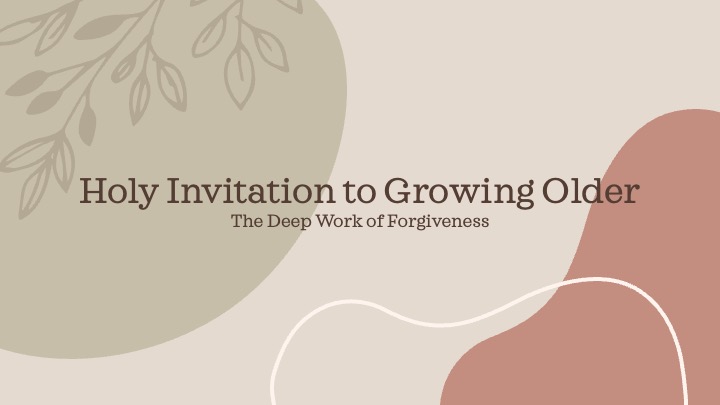
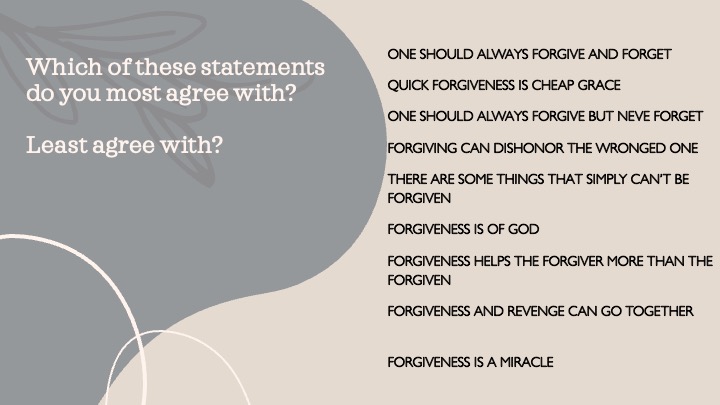
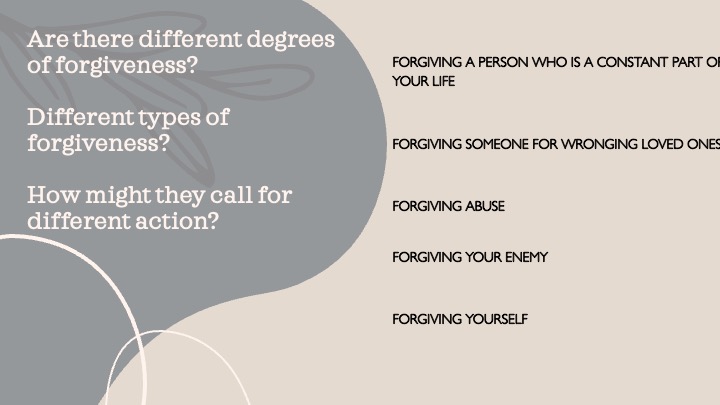
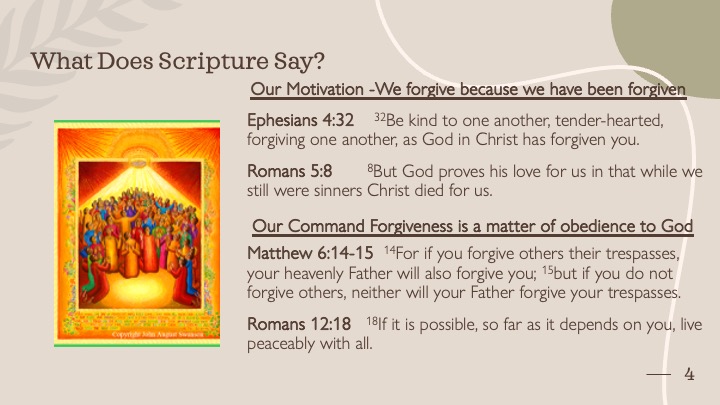
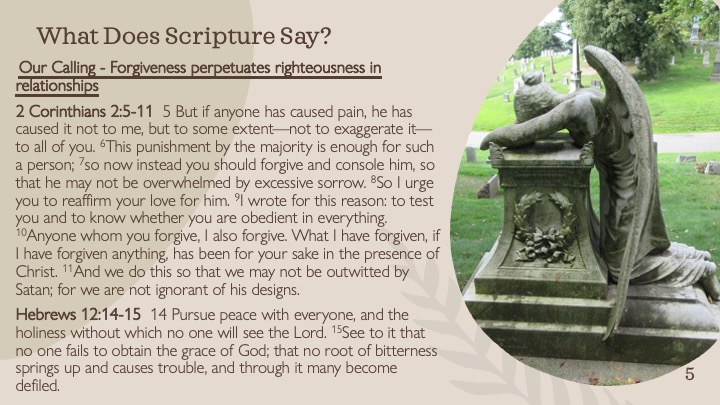
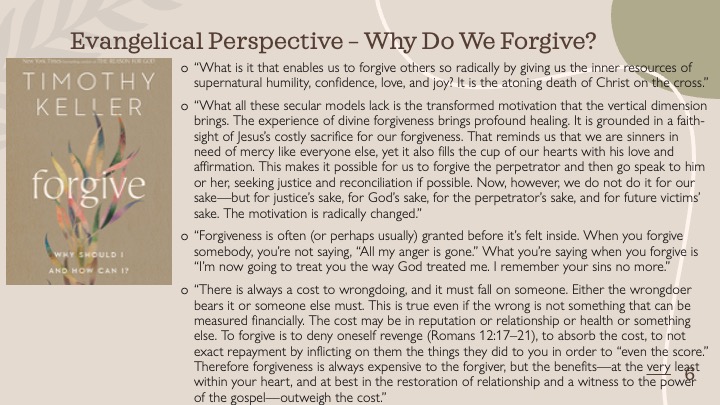
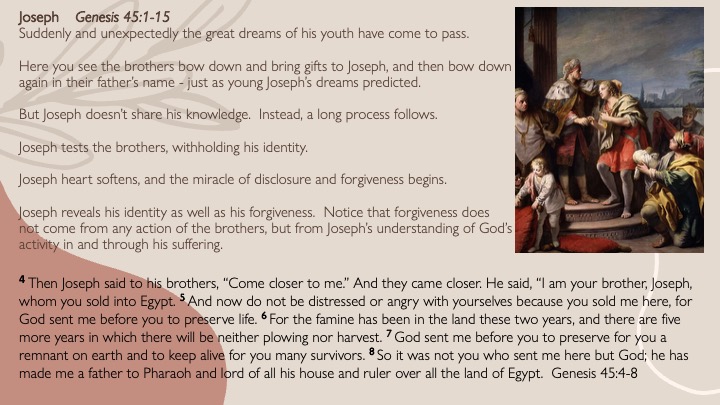
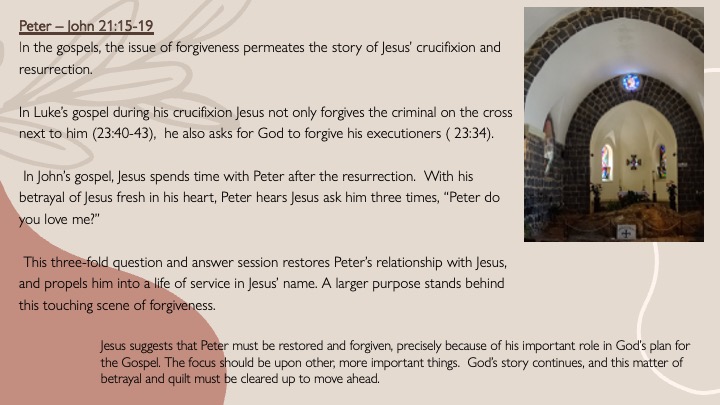
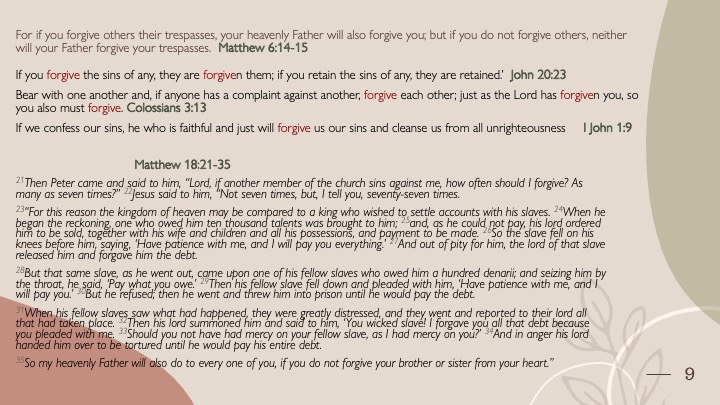
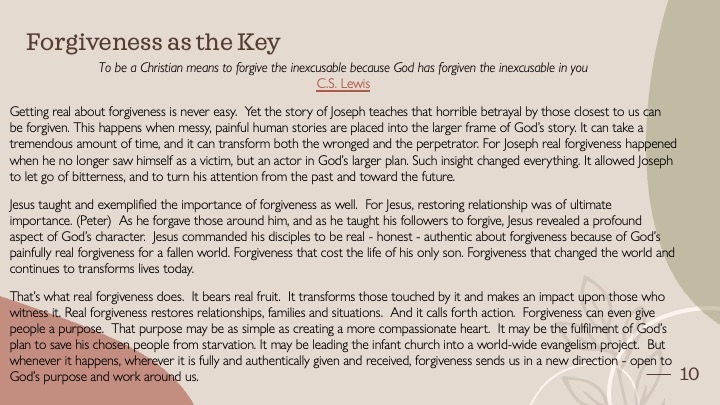
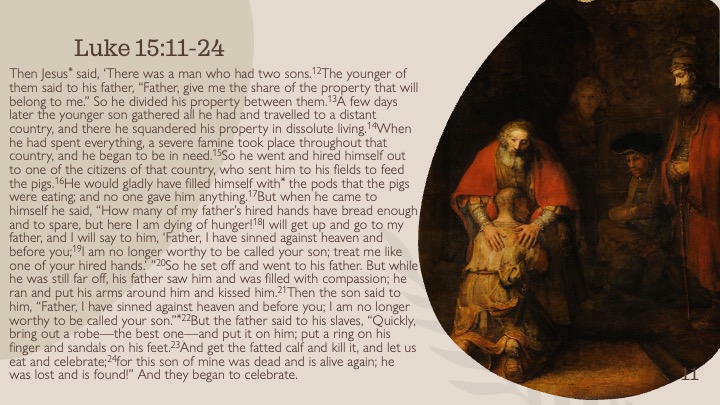
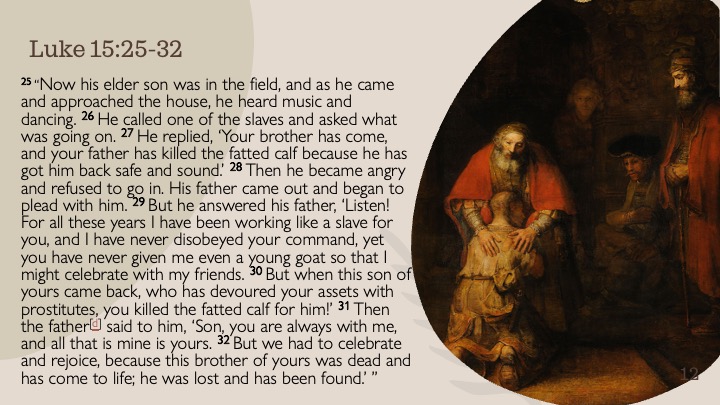
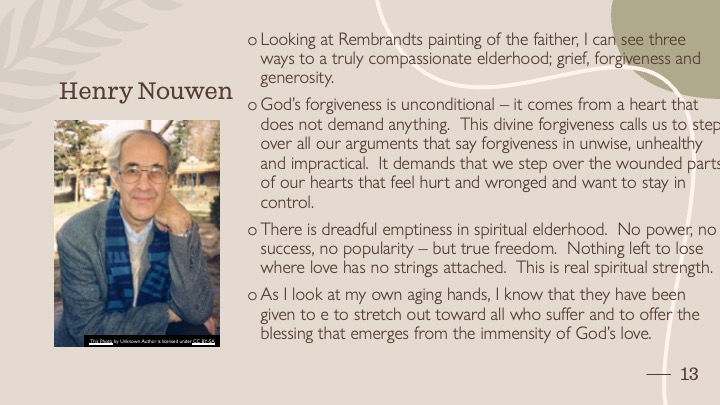
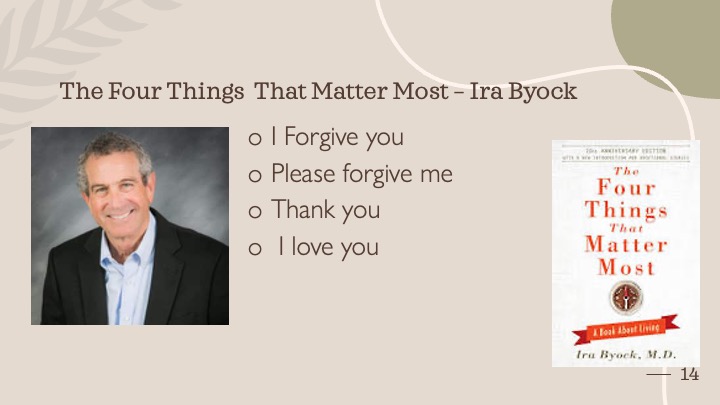
Growing Older 2
Links
< Home Page > < Growing Older Menu >
Growing Older Week 2 – The Text
Holy Invitation to Growing Older
The Deep Work of Forgiveness
Which of these statements do you most agree with?
Least agree with?
One should always forgive and forget
Quick forgiveness is cheap grace
One should always forgive but neve forget
Forgiving can dishonor the wronged one
There are some things that simply can’t be forgiven
Forgiveness is of God
Forgiveness helps the forgiver more than the forgiven
Forgiveness and revenge can go together
Forgiveness is a miracle
Are there different degrees of forgiveness?
Different types of forgiveness?
How might they call for different action?
Forgiving a person who is a constant part of your life
Forgiving Someone for wronging loved ones
Forgiving Abuse
Forgiving your Enemy
Forgiving Yourself
What Does Scripture Say?
Our Motivation -We forgive because we have been forgiven
Ephesians 4:32 32Be kind to one another, tender-hearted, forgiving one another, as God in Christ has forgiven you.
Romans 5:8 8But God proves his love for us in that while we still were sinners Christ died for us.
Our Command Forgiveness is a matter of obedience to God
Matthew 6:14-15 14For if you forgive others their trespasses, your heavenly Father will also forgive you; 15but if you do not forgive others, neither will your Father forgive your trespasses.
Romans 12:18 18If it is possible, so far as it depends on you, live peaceably with all.
Our Calling - Forgiveness perpetuates righteousness in relationships
2 Corinthians 2:5-11 5 But if anyone has caused pain, he has caused it not to me, but to some extent—not to exaggerate it—to all of you. 6This punishment by the majority is enough for such a person; 7so now instead you should forgive and console him, so that he may not be overwhelmed by excessive sorrow. 8So I urge you to reaffirm your love for him. 9I wrote for this reason: to test you and to know whether you are obedient in everything. 10Anyone whom you forgive, I also forgive. What I have forgiven, if I have forgiven anything, has been for your sake in the presence of Christ. 11And we do this so that we may not be outwitted by Satan; for we are not ignorant of his designs.
Hebrews 12:14-15 14 Pursue peace with everyone, and the holiness without which no one will see the Lord. 15See to it that no one fails to obtain the grace of God; that no root of bitterness springs up and causes trouble, and through it many become defiled.
Evangelical Perspective – Why Do We Forgive?
- “What is it that enables us to forgive others so radically by giving us the inner resources of supernatural humility, confidence, love, and joy? It is the atoning death of Christ on the cross.”
- “What all these secular models lack is the transformed motivation that the vertical dimension brings. The experience of divine forgiveness brings profound healing. It is grounded in a faith-sight of Jesus’s costly sacrifice for our forgiveness. That reminds us that we are sinners in need of mercy like everyone else, yet it also fills the cup of our hearts with his love and affirmation. This makes it possible for us to forgive the perpetrator and then go speak to him or her, seeking justice and reconciliation if possible. Now, however, we do not do it for our sake—but for justice’s sake, for God’s sake, for the perpetrator’s sake, and for future victims’ sake. The motivation is radically changed.”
- “Forgiveness is often (or perhaps usually) granted before it’s felt inside. When you forgive somebody, you’re not saying, “All my anger is gone.” What you’re saying when you forgive is “I’m now going to treat you the way God treated me. I remember your sins no more.”
- “There is always a cost to wrongdoing, and it must fall on someone. Either the wrongdoer bears it or someone else must. This is true even if the wrong is not something that can be measured financially. The cost may be in reputation or relationship or health or something else. To forgive is to deny oneself revenge (Romans 12:17–21), to absorb the cost, to not exact repayment by inflicting on them the things they did to you in order to “even the score.” Therefore forgiveness is always expensive to the forgiver, but the benefits—at the very least within your heart, and at best in the restoration of relationship and a witness to the power of the gospel—outweigh the cost.”
Joseph Genesis
45:1-15
Suddenly and unexpectedly the great dreams of his youth have come to pass.
Here you see the brothers bow down and bring gifts to Joseph, and then bow down
again in their father’s name - just as young Joseph’s dreams predicted.
But Joseph doesn’t share his knowledge.
Instead, a long process follows.
Joseph tests the brothers, withholding his identity.
Joseph heart softens, and the miracle of disclosure and forgiveness
begins.
Joseph reveals his identity as well as his forgiveness. Notice that forgiveness does not come from
any action of the brothers, but from Joseph’s understanding of God’s activity
in and through his suffering.
4 Then Joseph said to his brothers, “Come closer to me.”
And they came closer. He said, “I am your brother, Joseph, whom you sold into
Egypt. 5 And now do not be distressed or angry with
yourselves because you sold me here, for God sent me before you to preserve
life. 6 For the famine has been in the land these two
years, and there are five more years in which there will be neither plowing nor
harvest. 7 God sent me before you to preserve for you a
remnant on earth and to keep alive for you many survivors. 8 So
it was not you who sent me here but God; he has made me a father to Pharaoh and
lord of all his house and ruler over all the land of Egypt. Genesis 45:4-8
Peter – John 21:15-19
In the gospels, the issue of forgiveness permeates the story of Jesus’
crucifixion and resurrection.
In Luke’s gospel during his crucifixion Jesus not only forgives the criminal on
the cross next to him (23:40-43), he
also asks for God to forgive his executioners ( 23:34).
In John’s gospel, Jesus spends time with
Peter after the resurrection. With his
betrayal of Jesus fresh in his heart, Peter hears Jesus ask him three times,
“Peter do you love me?”
This three-fold question and answer
session restores Peter’s relationship with Jesus, and propels him into a life
of service in Jesus’ name. A larger purpose stands behind this touching scene
of forgiveness.
Jesus suggests that Peter must be restored and forgiven, precisely
because of his important role in God’s plan for the Gospel. The focus should be
upon other, more important things. God’s
story continues, and this matter of betrayal and quilt must be cleared up to
move ahead.
For if you forgive others their trespasses, your heavenly Father will also forgive you; but if you do not forgive others, neither will your Father forgive your trespasses. Matthew 6:14-15
If you forgive the sins of any, they are forgiven them; if you retain the sins of any, they are retained.’ John 20:23
Bear with one another and, if anyone has a complaint against another, forgive each other; just as the Lord has forgiven you, so you also must forgive. Colossians 3:13
If we confess our sins, he who is faithful and just will forgive us our sins and cleanse us from all unrighteousness I John 1:9
Matthew 18:21-35
21Then Peter came and said to him, “Lord, if another member of the church sins against me, how often should I forgive? As many as seven times?” 22Jesus said to him, “Not seven times, but, I tell you, seventy-seven times.
23“For this reason the kingdom of heaven may be compared to a king who wished to settle accounts with his slaves. 24When he began the reckoning, one who owed him ten thousand talents was brought to him; 25and, as he could not pay, his lord ordered him to be sold, together with his wife and children and all his possessions, and payment to be made. 26So the slave fell on his knees before him, saying, ‘Have patience with me, and I will pay you everything.’ 27And out of pity for him, the lord of that slave released him and forgave him the debt.
28But that same slave, as he went out, came upon one of his fellow slaves who owed him a hundred denarii; and seizing him by the throat, he said, ‘Pay what you owe.’ 29Then his fellow slave fell down and pleaded with him, ‘Have patience with me, and I will pay you.’ 30But he refused; then he went and threw him into prison until he would pay the debt.
31When his fellow slaves saw what had happened, they were greatly distressed, and they went and reported to their lord all that had taken place. 32Then his lord summoned him and said to him, ‘You wicked slave! I forgave you all that debt because you pleaded with me. 33Should you not have had mercy on your fellow slave, as I had mercy on you?’ 34And in anger his lord handed him over to be tortured until he would pay his entire debt.
35So my heavenly Father will also do to every one of you, if you do not forgive your brother or sister from your heart.”
Forgiveness as the Key
To be a Christian means to forgive the inexcusable
because God has forgiven the inexcusable in you
C.S. Lewis
Getting real about forgiveness is never easy. Yet the story of Joseph teaches that horrible betrayal by those closest to us can be forgiven. This happens when messy, painful human stories are placed into the larger frame of God’s story. It can take a tremendous amount of time, and it can transform both the wronged and the perpetrator. For Joseph real forgiveness happened when he no longer saw himself as a victim, but an actor in God’s larger plan. Such insight changed everything. It allowed Joseph to let go of bitterness, and to turn his attention from the past and toward the future.
Jesus taught and exemplified the importance of forgiveness as well. For Jesus, restoring relationship was of ultimate importance. (Peter) As he forgave those around him, and as he taught his followers to forgive, Jesus revealed a profound aspect of God’s character. Jesus commanded his disciples to be real - honest - authentic about forgiveness because of God’s painfully real forgiveness for a fallen world. Forgiveness that cost the life of his only son. Forgiveness that changed the world and continues to transforms lives today.
That’s what real forgiveness does. It bears real fruit. It transforms those touched by it and makes an impact upon those who witness it. Real forgiveness restores relationships, families and situations. And it calls forth action. Forgiveness can even give people a purpose. That purpose may be as simple as creating a more compassionate heart. It may be the fulfilment of God’s plan to save his chosen people from starvation. It may be leading the infant church into a world-wide evangelism project. But whenever it happens, wherever it is fully and authentically given and received, forgiveness sends us in a new direction - open to God’s purpose and work around us.
Luke 15:11-24
Then Jesus* said, ‘There was a man who had two sons.12The younger of them said to his father, “Father, give me the share of the property that will belong to me.” So he divided his property between them.13A few days later the younger son gathered all he had and travelled to a distant country, and there he squandered his property in dissolute living.14When he had spent everything, a severe famine took place throughout that country, and he began to be in need.15So he went and hired himself out to one of the citizens of that country, who sent him to his fields to feed the pigs.16He would gladly have filled himself with* the pods that the pigs were eating; and no one gave him anything.17But when he came to himself he said, “How many of my father’s hired hands have bread enough and to spare, but here I am dying of hunger!18I will get up and go to my father, and I will say to him, ‘Father, I have sinned against heaven and before you;19I am no longer worthy to be called your son; treat me like one of your hired hands.’ ”20So he set off and went to his father. But while he was still far off, his father saw him and was filled with compassion; he ran and put his arms around him and kissed him.21Then the son said to him, “Father, I have sinned against heaven and before you; I am no longer worthy to be called your son.”*22But the father said to his slaves, “Quickly, bring out a robe—the best one—and put it on him; put a ring on his finger and sandals on his feet.23And get the fatted calf and kill it, and let us eat and celebrate;24for this son of mine was dead and is alive again; he was lost and is found!” And they began to celebrate.
Luke 15:25-32
25 “Now his elder son was in the field, and as he came and approached the house, he heard music and dancing. 26 He called one of the slaves and asked what was going on. 27 He replied, ‘Your brother has come, and your father has killed the fatted calf because he has got him back safe and sound.’ 28 Then he became angry and refused to go in. His father came out and began to plead with him. 29 But he answered his father, ‘Listen! For all these years I have been working like a slave for you, and I have never disobeyed your command, yet you have never given me even a young goat so that I might celebrate with my friends. 30 But when this son of yours came back, who has devoured your assets with prostitutes, you killed the fatted calf for him!’ 31 Then the father[d] said to him, ‘Son, you are always with me, and all that is mine is yours. 32 But we had to celebrate and rejoice, because this brother of yours was dead and has come to life; he was lost and has been found.’ ”
Henry Nouwen
- Looking at Rembrandts painting of the faither, I can see three ways to a truly compassionate elderhood; grief, forgiveness and generosity.
- God’s forgiveness is unconditional – it comes from a heart that does not demand anything. This divine forgiveness calls us to step over all our arguments that say forgiveness in unwise, unhealthy and impractical. It demands that we step over the wounded parts of our hearts that feel hurt and wronged and want to stay in control.
- There is dreadful emptiness in spiritual elderhood. No power, no success, no popularity – but true freedom. Nothing left to lose where love has no strings attached. This is real spiritual strength.
- As I look at my own aging hands, I know that they have been given to e to stretch out toward all who suffer and to offer the blessing that emerges from the immensity of God’s love.
The Four Things That Matter Most – Ira Byock
- I Forgive you
- Please forgive me
- Thank you
- I love you